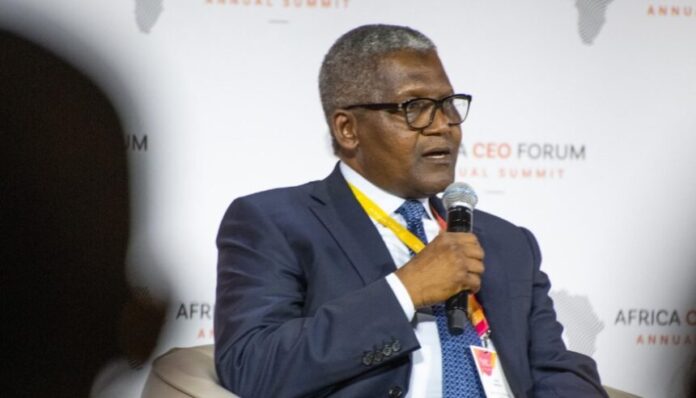The President and Chief Executive Officer, Dangote Group, Alhaji Aliko Dangote, has revealed that due to limited domestic refining capacity, Africa loses approximately $90 billion annually to importation of substandard petroleum products.
Dangote spoke at the ongoing West African Refined Fuel Conference in Abuja, organized by the Nigerian Midstream and Downstream Petroleum Regulatory Authority (NMDPRA) and S&P Global Commodity Insights.
Dangote revealed that, due to the continent’s Africa imports over 120 million tonnes of refined petroleum products annually, at a cost of approximately $90 billion.
He said: “As we speak today, we buy 9 – 10 million barrels of crude monthly from the US and other countries. I must thank NNPC for making some cargoes of Nigerian crude available to us from the start of production to date.”
Dangote said that despite producing around 7 million barrels of crude oil per day, Africa only refines about 40 percent of its 4.3 million barrels daily consumption of refined products domestically. In stark contrast, Europe and Asia refine over 95 percent of what they consume.
He stated: “So, while we produce plenty of crude, we still import over 120 million tonnes of refined petroleum products each year, effectively exporting jobs and importing poverty into our continent. That’s a $90 billion market opportunity being captured by regions with surplus refining capacity. To put this in perspective: only about 15 percent of African countries have a GDP greater than $90 billion. We are effectively handing over an entire continent’s economic potential to others—year after year.”
He lambasted the absence of harmonized fuel standards across African countries, which erects artificial impediments to regional trade in refined commodities.
According to him, “the fuel we produce for Nigeria cannot be sold in Cameroon or Ghana or Togo, even though we all drive the same vehicles. This lack of harmonisation benefits no one – except, of course, international traders, who thrive on arbitrage. For local refiners like us, it fragments the market and imposes unnecessary inefficiencies.”
Dangote, while highlighting the challenges of diesel production in Africa, explained, “to give one example, the diesel cloud point for Nigeria is 4 degrees. Without going into the technical details, this means that the diesel should work at a temperature of 4 degrees centigrade. Achieving this comes at a cost to us and limits the types of crude we could process. But how many places in Nigeria experience temperatures of 4 degrees? Other African countries have a more reasonable range of 7 to 12 degrees. This is a low hanging fruit which could be addressed by the regulators.”
He further highlighted the escalating influx of discounted, inferior fuel sourced from Russia, amalgamated with Russian crude under price caps, and subsequently offloaded into African markets.
“Compounding the issue, we are now confronted with the rising proliferation of inexpensive, frequently hazardous petroleum products—some of which are blended to substandard levels that would never be permitted in Europe or North America,” he remarked.
Dangote urged African governments to emulate the United States, Canada, and the European Union, which have instituted protective measures to safeguard their domestic refining industries.

